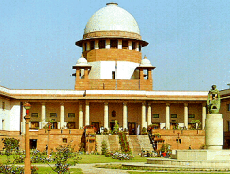 After an eventful first week of the year, we bring out quick summaries of the 6 blogposts we carried, along with 10 cases and other national and international IP developments for you. Important IP cases that we’re missing out on? Especially from other High Courts? Please let us know so we can include them!
After an eventful first week of the year, we bring out quick summaries of the 6 blogposts we carried, along with 10 cases and other national and international IP developments for you. Important IP cases that we’re missing out on? Especially from other High Courts? Please let us know so we can include them!
Highlights of the Week
A Look Back at India’s Top IP Developments of 2022

Continuing with our annual tradition, we curated a list of the top IP developments in India. We divided these developments under the following four heads -1) Topicality/ Impact, reflecting those decisions that we thought were important from a topical point of view and were covered by the media in some way owing to the importance of parties litigating or the issue being considered or for impact on industry and innovation/creativity ecosystem etc.; 2) Jurisprudence/Legal Lucidity, reflecting those decisions that we thought reflected a fair bit of jurisprudential rigour and/or legal lucidity; 3) IP Legislative and Policy Developments– covering important rules, release of policy notes, reports and news from the treaty negotiations that may have an impact on the Indian IP ecosystem; 4) Other IP developments that don’t fit into the above categories. Do you think any other cases should’ve made their way into our list? Let us know in the comments.
Access to any Supreme Court Case: Just a Few Clicks Away!
SpicyIP intern Gaurangi highlighted the launch of the e-SCR portal by the Supreme Court. The portal provides free access to 34,000 decisions by the Supreme Court from 1950 to 2021. Upon a few trial runs, she remarks that the platform is pretty user friendly and all the relevant information related to a judgement is made available to the user such as date of the decision, status of the case and case number within the platform.
provides free access to 34,000 decisions by the Supreme Court from 1950 to 2021. Upon a few trial runs, she remarks that the platform is pretty user friendly and all the relevant information related to a judgement is made available to the user such as date of the decision, status of the case and case number within the platform.
Other Posts
Wheels of Trademark Go Round-and-Round: Analyzing the ‘Yezdi’ Order of Karnataka High Court
 SpicyIP intern Pravertna discussed the Karnataka High Court decision in the Official Liquidator of M/s. Ideal Jawa (India) Ltd. v. Registrar of Trademarks and Ors., whereby the court held the mark to be in custody of the court and held the registration of the mark ‘Jawa’ in favor of Respondent no. 4 (Mr. Boman Irani) to be void. Highlighting the court’s opinion that goodwill can exist in the mark independent of registration, she remarks that the duration of 26 years of non use of the mark could have reduced the goodwill in the mark. Another notable aspect of the decision is the court’s understanding that external factors that prevent the a proprietor from making an application to renew the mark in time do not lead to loss of distinctiveness by non-use. With regard to this, she highlights, that this may result into a situation where the proprietor can sleep on its duties to renew the mark under the veil of infringement by others.
SpicyIP intern Pravertna discussed the Karnataka High Court decision in the Official Liquidator of M/s. Ideal Jawa (India) Ltd. v. Registrar of Trademarks and Ors., whereby the court held the mark to be in custody of the court and held the registration of the mark ‘Jawa’ in favor of Respondent no. 4 (Mr. Boman Irani) to be void. Highlighting the court’s opinion that goodwill can exist in the mark independent of registration, she remarks that the duration of 26 years of non use of the mark could have reduced the goodwill in the mark. Another notable aspect of the decision is the court’s understanding that external factors that prevent the a proprietor from making an application to renew the mark in time do not lead to loss of distinctiveness by non-use. With regard to this, she highlights, that this may result into a situation where the proprietor can sleep on its duties to renew the mark under the veil of infringement by others.
Exemptions Granted to Certification Marks: Why Does a Lack of Section 9(1)(b) Exemption Defeat the Purpose?
In this guest post, Akshay Ajayakumar highlights quandary about the exemptions granted to
 certification marks u/s 69. He argues that by not exempting a certification mark from Section 9(1)(b), the statute has subjected them to an additional burden of acquiring distinctiveness, before being registered. In the latter part of the post, he argues that such an exemption is necessary for certification marks specifically.
certification marks u/s 69. He argues that by not exempting a certification mark from Section 9(1)(b), the statute has subjected them to an additional burden of acquiring distinctiveness, before being registered. In the latter part of the post, he argues that such an exemption is necessary for certification marks specifically.
Kaushal Kishor v. State Of UP: A Tale of Mis-Readings and Bad Externalising
 In this guest post, Akshat Agrawal analyses the majority and dissent opinion of the Supreme Court in Kaushal Kishor v. State Of UP. Regarding the implication of the decision on IP, he interprets the judgment to extend the concept of State and its instrumentalities to include any in rem/ public action by anyone. According to him, this can expand the contours of Section 52 of the Copyright Act, to include within itself, any informational use and access, that is required for essential in rem purposes.
In this guest post, Akshat Agrawal analyses the majority and dissent opinion of the Supreme Court in Kaushal Kishor v. State Of UP. Regarding the implication of the decision on IP, he interprets the judgment to extend the concept of State and its instrumentalities to include any in rem/ public action by anyone. According to him, this can expand the contours of Section 52 of the Copyright Act, to include within itself, any informational use and access, that is required for essential in rem purposes.
SpicyIP Tidbit: CGPDTM notifies Trademark and Patent Agent Examinations
In this tidbit, Praharsh informed our readers about the re-notification of the Trademark and Patent Agent Examination 2023. While the Patent Agent Examination took place in 2022, the Trademark Agent Examination is taking place after a gap of 10 years! There are some interesting questions being brought up in the comments of this post, if any other informed readers would like to respond.
Agent Examination 2023. While the Patent Agent Examination took place in 2022, the Trademark Agent Examination is taking place after a gap of 10 years! There are some interesting questions being brought up in the comments of this post, if any other informed readers would like to respond.
Case Summaries
Bombay High Court discusses basics of Acquiescence and Honest and Concurrent use, grants interim injunction against Defendant’s use of the mark ‘Regal’.
In an extremely detailed order, Bombay High Court passed an interim injunction restraining the Defendant from using the identical mark “Regal”. The key concepts discussed by the court in this decision pertains to the issue of acquiescence and honest and concurrent use. On acquiescence, the court reiterated that for acquiescence “there must be positive acts supported by weighty material as it entails an equitable defeasment of a statutory right conferred upon a party.” And on honest and concurrent use the court relied on the Delhi HC’s decisions in Hindustan Pencil Pvt. Ltd. v. India Stationary Products and KEI Industries v. Raman Kwatra (note: KEI industry case has been set aside by the Division bench of the Delhi High Court.) to hold that while honest and concurrent use can be a defence against damages, it is not a statutory defence and that it is not a shield against an injunction.
Delhi High Court reiterates that the Controller cannot raise new grounds of objections at the time of hearing.
Accepting an appeal, the Delhi High Court set aside the impugned order from the Controller rejecting the patent application on the basis of Section 3(f). The Plaintiff had argued that the Controller raised the Section 3(f) objection during the hearing, without any prior notice and thus the order should be set aside. The court assessed the contents of circular on “Examination of Patent Applications and Consideration of Report of Examiner by Controller” and clarified that the Controller is not permitted to raise new grounds of objection at the time of the hearing.
the patent application on the basis of Section 3(f). The Plaintiff had argued that the Controller raised the Section 3(f) objection during the hearing, without any prior notice and thus the order should be set aside. The court assessed the contents of circular on “Examination of Patent Applications and Consideration of Report of Examiner by Controller” and clarified that the Controller is not permitted to raise new grounds of objection at the time of the hearing.
Delhi High Court to revisit the issue “whether rights under registered trademarks can be enforced after giving up the right to file actionable claims qua the same by claiming an exemption from GST” Directs the Senior Standing Counsel, Dept. Revenue to share copy of its report filed earlier.
Case: Adani Wilmar Limited vs Baljit Agro Tech Pvt. Ltd. & Anr on 4 January, 2023 (Delhi High Court)
In a suit concerning permanent injunction against the Defendant, the Plaintiff raised an issue pertaining to legal effect of declaration made by Defendant in their affidavit for seeking GST exemption by voluntarily foregoing any actionable claim or enforceable right in respect of its mark. The Delhi High Court directed the Senior Standing Counsel, Dept. of Revenue to file the report on the proposition “whether rights in trademarks can be enforceable under the Trade Marks Act, 1999 in respect of registered trademarks after giving up the right to file actionable claims qua the same very brands by claiming an exemption from GST” that he had previously submitted in another case- Amritsar Rice Land v. Sumit Bansal & Anr. and renotified the matter for 12th Jan, 2023.
Delhi High Court allows an appeal against the Registry’s order in just 39 days. Holds ‘Swiss Military’ mark cannot be registered by the defendant as it amounts to false trade description.
Case: Armasuisse v. Trademark Registry and Anr on 4 January, 2023 (Delhi High Court)
 Allowing an appeal against the order of the Respondent granting registration to Promoshirt for the mark depicting a red cross with words ‘Swiss Military’, Delhi High Court held that such a use will amount to false trade description and will force the consumers to believe that the goods were manufactured in Switzerland. In a piece on Bar and Bench covering this case, it has been highlighted that the IPD decided the case in just 39 days from the date of appeal.
Allowing an appeal against the order of the Respondent granting registration to Promoshirt for the mark depicting a red cross with words ‘Swiss Military’, Delhi High Court held that such a use will amount to false trade description and will force the consumers to believe that the goods were manufactured in Switzerland. In a piece on Bar and Bench covering this case, it has been highlighted that the IPD decided the case in just 39 days from the date of appeal.
ITAT clarifies that deductions for clinical trials conducted by outsourced agencies can be claimed under Section 35 (2AM) of the Income Tax Act.
The Tribunal clarified that the weighted deduction towards research and development expenses incurred in conducting laboratory and clinical trials can still be claimed under the IT Act when such trials are outsourced to other agencies. Focusing on the language of the provision – Section 35(2AB), and the legislative intent behind it, the tribunal interpreted the terminology “on in -house” to not mean “within the premises” and held that the expenses incurred towards clinical trial conducted outside the approved facilities would be eligible for weighted deduction u/s.35(2AB).
‘Permitted use’ under the Trademarks Act requires a written agreement, reiterated Delhi High Court.
Case: Aiwa Co Ltd. vs Aivva Enterprises Private Ltd. and Ors. on 5 January, 2023 (Delhi High Court)
Delhi High Court confirmed the ex-parte interim injunction, passed against the Defendant for using a deceptively similar mark ‘Aivva’. It is notable that the impugned mark is registered in the name of one Mr. Ajjay Advani, who was not impleded as a necessary/ proper party to the case. The Defendants claim to be the permitted user of this mark. On permitted use, the court emphasized on the need to have a written agreement, and rejected the Defendant’s reliance on an affidavit by Mr. Advani, holding that it cannot amount to “permitted use”. Furthermore, The court also observed that that the onus to prove that the Plaintiff was aware of its use of ‘Aivva’ years before the institution of the suit falls on the Defendant. It observed that simply because the Plaintiff’s assignee would have been aware of the Defendant’s use of the impugned mark, will not mean that the Plaintiff is also aware of it.
deceptively similar mark ‘Aivva’. It is notable that the impugned mark is registered in the name of one Mr. Ajjay Advani, who was not impleded as a necessary/ proper party to the case. The Defendants claim to be the permitted user of this mark. On permitted use, the court emphasized on the need to have a written agreement, and rejected the Defendant’s reliance on an affidavit by Mr. Advani, holding that it cannot amount to “permitted use”. Furthermore, The court also observed that that the onus to prove that the Plaintiff was aware of its use of ‘Aivva’ years before the institution of the suit falls on the Defendant. It observed that simply because the Plaintiff’s assignee would have been aware of the Defendant’s use of the impugned mark, will not mean that the Plaintiff is also aware of it.
Delhi High Court to revisit whether patent applications on computer programs can be objected under Section 3(k).
The case highlights development regarding computer programs patents, brewing up in the Delhi High Court. The Controller had refused to grant a patent to the Plaintiff on basis of Section 3(k). However, the Plaintiff relied on the “Revised Guidelines for Examination of Computer Related Inventions, 2017” and the decision in Ferid Allani v. Union of India to appeal against the impugned order. Considering several appeals on the similar issue, that is pending for adjudication, the court re-notified the case for 23rd Feb, ‘23.
CIC reiterates that clarifications on interpretations of a provision cannot be sought via an RTI application.
Case: Charanjeet Singh vs CPIO, Trademarks Registry on 5 January, 2023 (Chief Information Commission)
In an appeal against the order of the CPIO, the CIC held that the information sought is in nature of clarifications from the CPIO on the interpretation of Section 132 of Trade Marks Act and thus, held to be outside the scope of Section 2(f) of the RTI Act. Additionally the commission remarked that “Adverting to Appellant’s insistence seeking clarifications, it shall be noted that outstretching the interpretation of Section 2(f) of the RTI Act to include deductions and inferences to be drawn by the CPIO is unwarranted as it casts immense pressure on the CPIOs to ensure that they provide the correct deduction/inference to avoid being subject to penal provisions under the RTI Act.” and reiterated on the decision of CBSE vs. Aditya Bandopadhyay & Ors. wherein the Supreme Court had clarified that “A public authority is also not required to furnish information which require drawing of inferences and/or making of assumptions.”
Applying the doctrine of ejusdem generis, Division Bench of Delhi High Court sets aside the interim injunction granted against the Appellant for using a similar mark on dissimilar goods.
Case: Mr. Raman Kwatra & Anr. v. Kei Industries Limited on 6 January, 2023 (Delhi High Court)
The Delhi High Court set aside its order of a single judge bench whereby the Appellant was restrained from using the impugned Kwality label. The Court observed that by applying the rule of ejusdem generis on Section 29(4) of the Trade Marks Act, 1999, the goods dealt with by the Appellant would not cover goods of “other kinds of electrical and electronic instruments” as used by the Respondent. Hence, infringement on part of Appellant was held unsustainable. On the finding that honest and concurrent use by the defendant cannot be a defence against an infringement, the court remarked that “Prima facie, it would follow that where special circumstances exist that warrant grant of registration of identical or similar trademarks in respect of similar goods and services, the person claiming entitlement to such registration may also be entitled to resist a restraining order for use of such trademark.”
An Injunction cannot force an artist to continue with contract for personal service even though mutual trust between the parties has been lost, rules Delhi High Court .
 While declaring the instant suit as a suit for specific performance of a ‘contract of service’ barred under Section 14(c) and (d) of the Specific Relief Act, 1963, the Delhi High Court held that the plaintiff cannot claim any copyright in the songs/content that are yet to come into being. The bench observed that once the parties have lost mutual trust and confidence in each other, an injunction compelling the Artist to continue with its contractual obligations with the plaintiff company cannot be granted.
While declaring the instant suit as a suit for specific performance of a ‘contract of service’ barred under Section 14(c) and (d) of the Specific Relief Act, 1963, the Delhi High Court held that the plaintiff cannot claim any copyright in the songs/content that are yet to come into being. The bench observed that once the parties have lost mutual trust and confidence in each other, an injunction compelling the Artist to continue with its contractual obligations with the plaintiff company cannot be granted.
Other developments
- MoU signed for commercial production of indigenously developed vaccine “Lumpi-ProVac” which is used for for the prophylactic immunization of animals against Lumpy Skin Disease.
- India to witness price hike for APIs, but no shortage with Covid situation in China: Pharmexcil.
- Kuku FM settles case with Pocket FM in audiobooks case.
- Jaipur Police passes a circular, clarifying that no licenses required for using sound recordings during weddings and regional events.
- Medical Parliamentarians write to the PM seeking universal free cancer care in India.
- Holding DigiPe to be prima facie deceptively similar to PhonePe, and considering that proprietors of Digipe have not entered UPI busiess yet, Madra High Court temporarily restrains the use of ‘Digipe’.
- Google preparing to approach Supreme Court of India against the CCI’s ruling that will force it to change how it markets its android platform.
- Genetic Engineering Appraisal Committee (GEAC) rushed environmental approvals for a locally developed GM variety of mustard, alleges a group of Activists.
- Patent granted to BioPrime AgriSolutionsfor the invention of a Bio-Formulation to manage Abiotic Stress in plants and to improve the yield.
International Developments 
- In a follow up, it is reported that CDMX prosecutor’s office will not pursue criminal action in the case of Yasmín Esquivel and the plagiarized thesis.
- Sir Arthur Conan Doyle’s ‘The Case-Book of Sherlock Holmes’ enters public domain. Other works to follow suit in 2023 include Virginia Woolf’s ‘To The Lighthouse’, Ernest Hemingway’s ‘Men Without Women’, William Faulkner’s ‘Mosquitoes’ and Agatha Christie.
